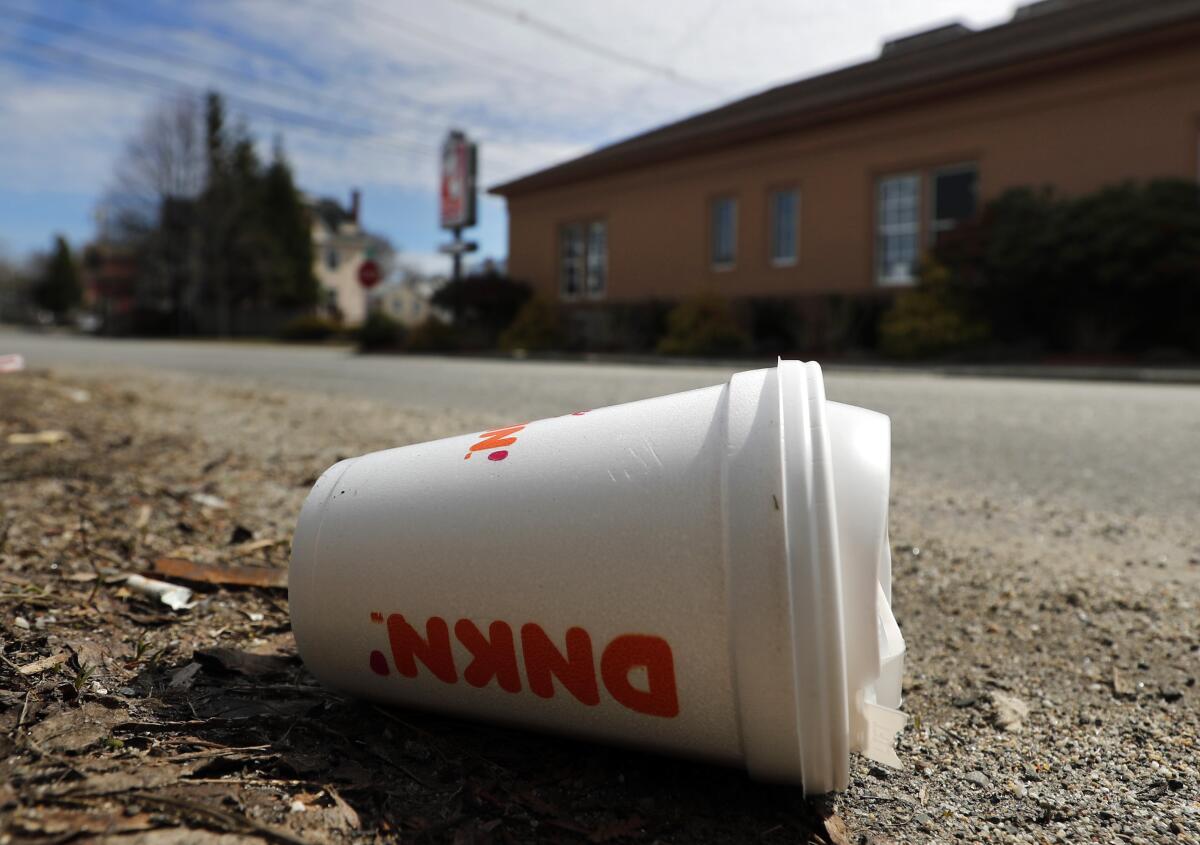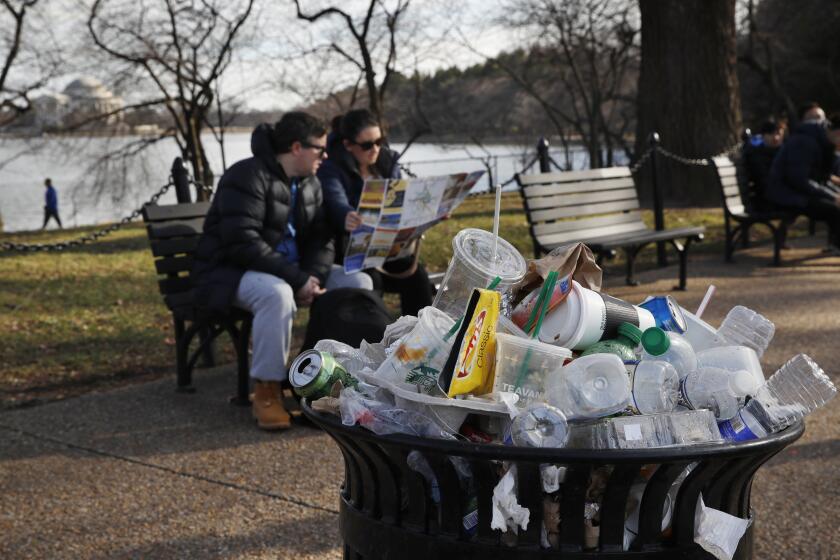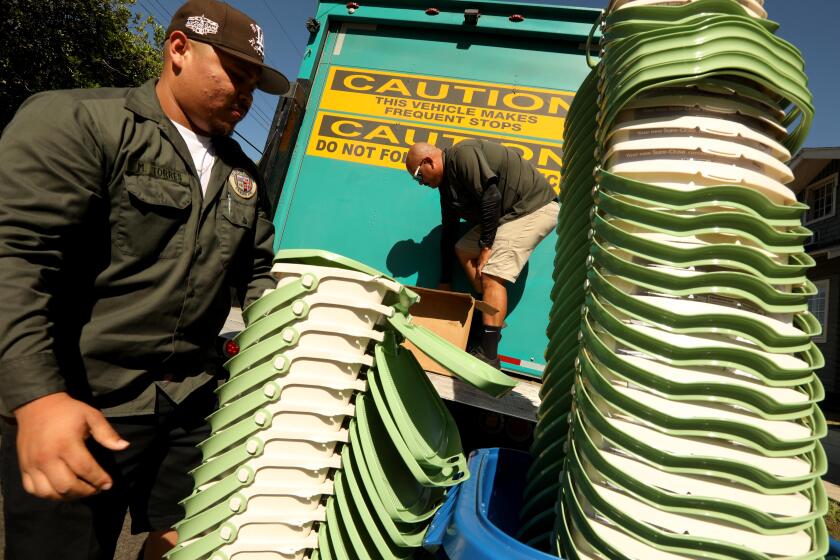Los Angeles officials ban polystyrene foam products in move toward ‘zero-waste’ city

- Share via
The Los Angeles City Council has approved a new ban on certain single-use plastics, taking the latest step in an effort toward becoming a “zero-waste” city.
All 12 council members present for Tuesday’s meeting voted to approve an ordinance that prohibits the distribution and sale of expanded polystyrene products, often colloquially known by the trade name Styrofoam, though the brand is used in insulation and construction, not food packaging.
The new ban comes alongside two similar ordinances — which closed loopholes in the city’s single-use plastic bag ban and will require city departments to have zero-waste practices at city facilities and events — that were also passed without an opposing vote Tuesday.
“Today, Los Angeles is once again taking the lead in defense of our environment,” said Councilmember Mitch O’Farrell. “We’re leading by example by committing to zero-waste policies in the operation of the city, and we’re moving forward with some of the boldest local ordinances in the country to reduce single-use plastic waste.”
The L.A. City Council backed further restricting plastic forks and other disposable items.
The expanded polystyrene ban will take effect April 23 and is aimed at large food or beverage facilities such as restaurants, coffee shops, bars and vendors; as well as large retail establishments, defined as “any commercial establishment located within the city that sells goods directly to customers primarily for the customer’s own consumption or use.”
Businesses with more than 26 employees will be affected, according to the ordinance. If a business is part of a state or national chain, “the employee count shall include all employees of that chain.”
Some products will be exempt from the ban, including surfboards or coolers that are completely enclosed “in a more durable material”; craft supplies; packaging or containers for drugs, medical devices or biological materials; safety devices such as life preservers, helmets and vehicle impact prevention systems; and certain construction and building materials.
Health facilities and residential care facilities for the elderly will be exempt from the ban, according to the ordinance. The ban can also be temporarily suspended if the U.S. president or California governor declares “a disaster or local emergency” in Los Angeles.
Such a temporary suspension must be enacted by a City Council resolution that’s subject to the mayor’s approval and would allow “any food or beverage facility or retail establishment” assisting with disaster relief efforts to use expanded polystyrene to distribute food or beverages “to any person using a city facility,” according to the ordinance.
The legislation heads off what would be a costly and contentious ballot measure and pushes California ahead of the world in the fight against plastic waste.
When the council voted in April to direct the city attorney to draft the ordinances targeting plastics, members cited the blight of litter on the streets, in parks and waterways and on the beaches, and noted the cost of picking up and processing such refuse.
O’Farrell said that Angelenos want to be good stewards of the environment and that there is no place in the city for harmful products such as polystyrene.
“Our world is drowning in plastic, to the point where, in any given week, each of us ingests enough plastic from our food and water to make a credit card,” Council President Paul Krekorian said. “The petrochemical industry is lying to the people of the United States by trying to convince them that somehow it’s OK to use these products because they’re recyclable. They’re not. Almost no plastic ever gets recycled, and Styrofoam definitely does not.”
Councilmember Paul Koretz, who originally introduced the ordinance, called expanded polystyrene “toxic from production to usage to landfill.”
Compounds in the foam are known carcinogens, the manufacturing process negatively affects workers and can contaminate neighborhoods, and the toxins from containers made of the material can leach into hot drinks and food, Koretz said.
On Tuesday, City Council members approved an additional ordinance that aims to promote the use of reusable bags and regulate the use of plastic and paper single-use carryout bags at apparel stores, farmers markets, food or beverage facilities, hardware stores and open air markets, officials said.
The ordinance requiring zero-waste practices at city facilities and events will ban single-use plastics at places such as the Los Angeles Zoo.
Behind other cities, Los Angeles is moving ahead with its residential composting program, an effort to spare landfills and reduce methane emissions.
Council members also approved instructions to L.A. Sanitation & Environment requiring compliance reports by April 2025 for the council to review, as well as the creation of outreach programs.
Environmental groups are celebrating the package of ordinances.
Tracy Quinn, president and chief executive of Heal the Bay, said solutions like the ban on expanded polystyrene are necessary to address “upstream sources” and slow down the production and sale of the products.
“It is clear that cleanups will never solve the issue of plastic pollution,” Quinn said. “To truly protect public health, we need aggressive and responsible solutions like today’s unanimous vote.”
Reusable LA, a coalition aimed at reducing plastic pollution in Los Angeles, said in a statement that advocates had been working on banning expanded polystyrene for more than a decade.
“Los Angeles creates nearly 30 million tons of municipal waste each year, and plastic is the greatest contributor to the waste stream by item,” according to the statement. “These measures will reduce waste, save businesses money, lessen our dependence on fossil fuels, and improve public health.”
More to Read
Sign up for Essential California
The most important California stories and recommendations in your inbox every morning.
You may occasionally receive promotional content from the Los Angeles Times.














